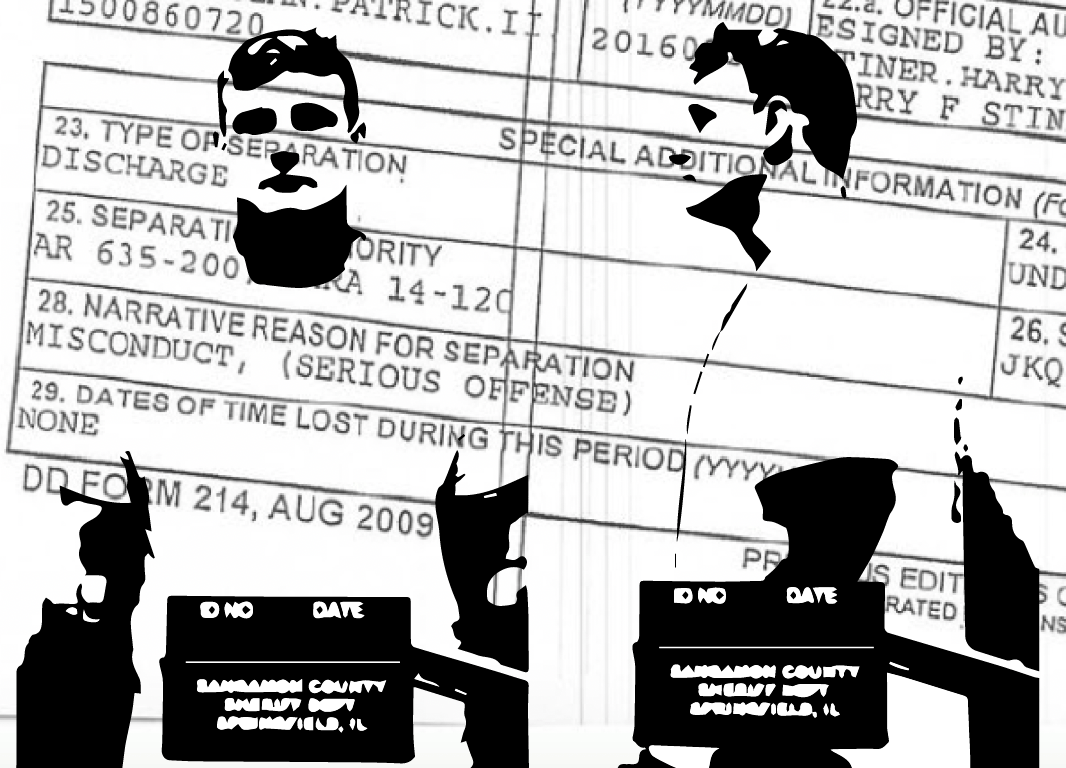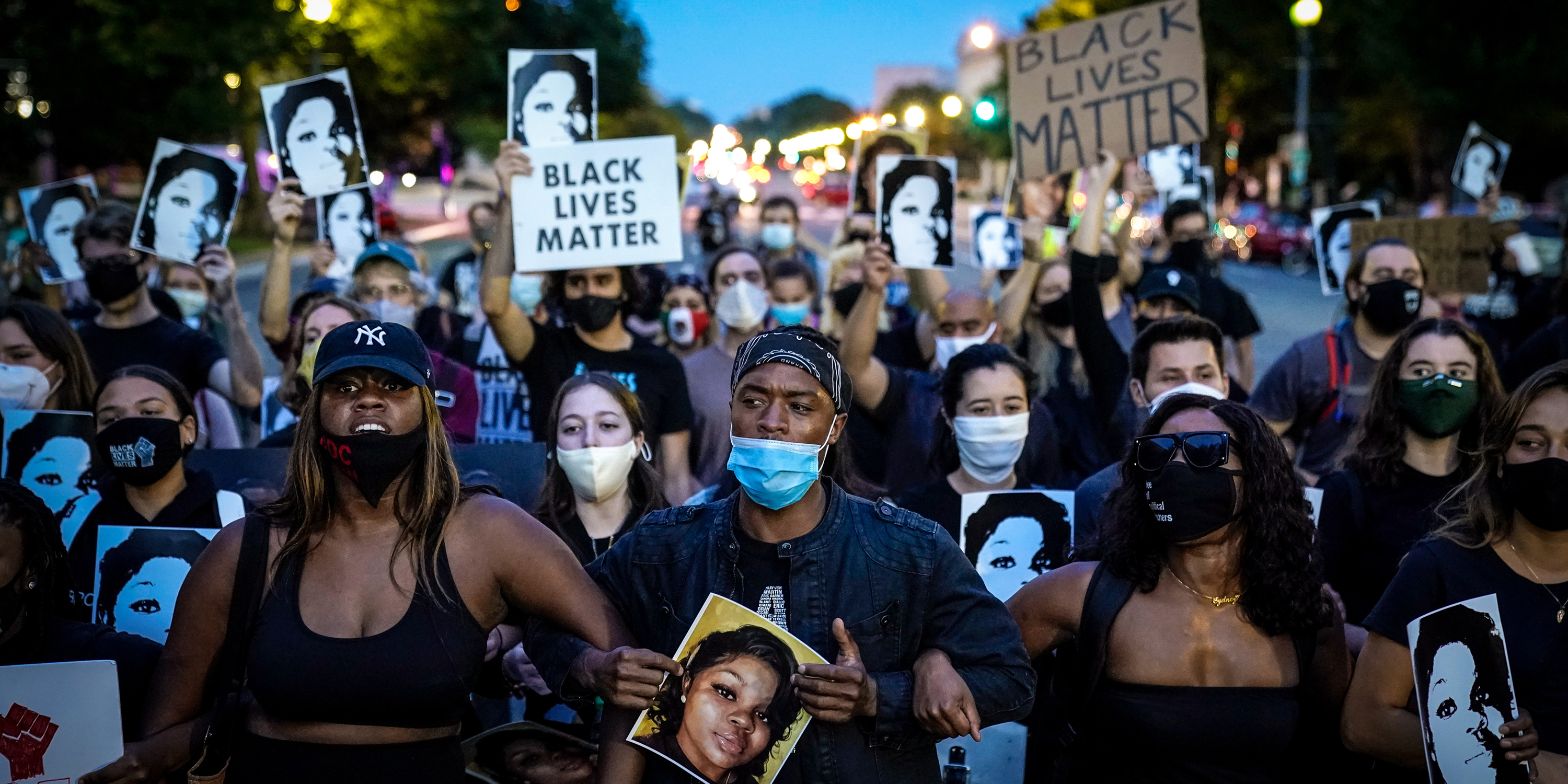In partnership with
This story was originally published by Invisible Institute, IPM Newsroom, and the Investigative Reporting Workshop
Sean Grayson, the former Sangamon County Sheriff’s deputy now charged with murder in the fatal shooting of Sonya Massey, was previously discharged from the U.S. Army for serious misconduct, military records show.
Grayson, who is white, was indicted by a grand jury in the July 6 death of Massey, who is Black. Ben Crump, the family’s attorney, said the U.S. Department of Justice has also opened an investigation into the incident, but the agency said in a statement that it is “assessing the circumstances” and following the criminal case.
Documents obtained from the Kincaid Police Department in Illinois, where Grayson worked previously, note that Grayson was discharged from the Army in 2016 from the Fort Riley Army installation in Kansas for “Misconduct (Serious Offense).” Army officials confirmed Grayson was a wheeled vehicle mechanic from May 2014 to February 2016, but declined to provide further details about his discharge.
“The Privacy Act and (Department of Defense) policy prevent us from releasing information relating to the misconduct of low-level employees or characterization of service at discharge,” Army spokesperson Bryce S. Dubee wrote in an email. Officials at Fort Riley and the Fort Riley Military Police directed reporters to file an official records request.
Anthony Ghiotto, a former Air Force prosecutor who now teaches law at the University of Illinois, said there are several reasons why a service member could receive this type of discharge in lieu of a court-martial proceeding or if the member commits a civilian infraction that can’t be disciplined through the military justice system.
Ghiotto said this kind of discharge suggests that Grayson committed an offense equivalent to something that would have led to at least a year of incarceration for a civilian.
“A good way of looking at it is, if it would be a misdemeanor in the civilian world, it’s not going to be a ‘serious offense,’” he said. He added it’s likely Grayson was not court-martialed.
Daniel Fultz, Grayson’s defense attorney, declined to comment about the nature of his discharge from the Army. Fultz told Sangamon County Circuit Court Judge Ryan Cadagin on July 17 at Grayson’s arraignment that Grayson received an honorable discharge after serving three years in the Army.
However, the DD Form 214 summarizing Grayson’s tenure in the Army indicates he did not receive an honorable discharge.
Grayson also didn’t receive a dishonorable discharge, but Ghiotto said the DD Form 214 indicated Grayson was “kicked out” of the Army for serious misconduct before his regular term of enlistment was up.
Grayson received a “general” discharge under “honorable conditions,” which Ghiotto said means some, but not all, of Grayson’s service was honorable. That type of discharge should be a “red flag” to potential future employers, Ghiotto said. But he said a “bigger red flag” is the listing of misconduct.
It’s unclear what the misconduct entailed. Offenses that can lead to a finding of misconduct can include drug abuse, sexual assault and going AWOL, or “absent without official leave,” Ghiotto said.
The Kansas Bureau of Investigation confirmed Grayson was not convicted of any crimes in Kansas, the state where he was stationed with and discharged from the Army. However, the bureau’s records do not reflect whether Grayson was previously arrested or charged with any crimes that were later withdrawn, sent to a diversion program, or did not result in a conviction.
Invisible Institute, Illinois Public Media, and the Investigative Reporting Workshop contacted law enforcement agencies in the counties surrounding Fort Riley. The Riley County Police Department said its only contact with Grayson came in 2015, when he hit a deer with his truck. The Geary County Sheriff’s Office refused to search for contacts between its agency and Grayson, claiming over the phone that to do so would be illegal. The Junction City Police Department said it did not have records of any contact with him.
Details are still emerging about the July 6 shooting of Massey, a Black woman who called the Sangamon County Sheriff’s Department because of a suspected intruder at her home. Body-camera footage that has since been released shows that Grayson shot Massey three times after entering her home alongside another deputy and telling her to drop a pot of boiling water she was holding. The footage shows Massey ducking with her hands up, and saying “I’m sorry,” before Grayson fired, and that the officer later discouraged his fellow deputy from providing medical aid.
“She’s done,” Grayson said. “You can go get it, but that’s a head shot.”
The case has spurred national outcry and prompted President Joe Biden and Vice President Kamala Harris to call for further police reform.
Following the shooting, Grayson was charged with first-degree murder, aggravated battery with a firearm, and official misconduct. He pleaded not guilty to all charges and is currently being held in the Menard County Jail without bond.
He was fired by the Sangamon County Sheriff’s Office shortly after charges were filed. Sangamon County Sheriff Jack Campbell wrote in a statement posted online that Grayson’s actions do not reflect the values or training of his office.
“Sonya Massey lost her life due to an unjustifiable and reckless decision by former Deputy Sean Grayson,” Campbell wrote. “Grayson had other options available that he should have used. He will now face judgment by the criminal justice system and will never again work in law enforcement.”
In response to a request from Illinois Times, Campbell said in a statement, “The sheriff’s office had a copy of deputy Grayson’s Certificate of Release or Discharge which states that Grayson was given a general honorable discharge from the military.”
However, Ghiotto, the U of I law professor, said the form to which Campbell referred listed the “character” of Grayson’s service as “under honorable conditions (general),” which can be confusing for a lay person. But the nature of Grayson’s separation from the military was an involuntary discharge, Ghiotto said.
In Campbell’s statement, he also said his office “understood that the serious misconduct referenced in these documents was a DUI. We were aware of the DUI at the time of hire.”
The sheriff’s “understanding” appeared to be based on an undated reference letter that Grayson submitted with his application in which Ray Benekin, Grayson’s commanding officer in the Army, wrote, “Aside from Mr. Grayson’s DUI, there were no other issues that he had during his tenure in the Army.”
Other reporting has also shown that Grayson received two DUI convictions in Macoupin County in 2015 and 2016, both of which the Sangamon County Sheriff’s Department has confirmed it was aware of. Ghiotto said it’s extremely unlikely that a misdemeanor DUI conviction would account for the serious misconduct finding by the Army.
One of the DUIs took place while Grayson was still on active duty, and the other citation occurred after his discharge.
When Grayson was held in Macoupin County Jail, records show he refused to submit a breath sample. After threatening to pee his pants or pee in a trashcan in his holding cell, Grayson told the officer who arrested him that he was “too small to be making him mad,” according to records from Macoupin County Sheriff’s Office. The records also show that his Kansas license had been suspended, but did not say the reason.
An online petition calling for Campbell’s resignation has garnered over 2,500 signatures, and Massey’s father has said he should step down.
Civil rights attorney Ben Crump, who is representing Massey’s family, said it is “appalling” that Grayson would have been hired despite significant misconduct while in the Army.
“It makes you wonder what else was missed or overlooked in his hiring process with the sheriff’s department,” Crump said. “When you look at the video coupled with the fact that he’s had six different law enforcement agencies in the last four years, it raises all sorts of red flags.”
Records show that Grayson, 30, has worked for six police departments across Central Illinois since 2020.
Grayson started as a part-time officer with the Pawnee Police Department, which did not reply to requests for comment. He remained employed with Pawnee PD for almost a year, and was also hired part-time with the Kincaid Police Department.
Kincaid Police Chief DJ Mathon said that Grayson was let go from the job after he refused to live within a 10-mile radius, as required by the Village of Kincaid. He said the department had no records of complaints or disciplinary actions against Grayson during his time there.
“I watched the video today actually,” said Mike Lawrence, a member of the Village of Kincaid’s Board of Trustees. “It was disgusting [and] it was shocking because it was so wrong.”
Lawrence confirmed he was unaware of Grayson’s discharge from the Army for serious misconduct. The news of Grayson’s killing of Massey wasn’t a surprise, he said, because of the impression he made while he was at the Kincaid Police Department.
“I thought he was a loose cannon,” Lawrence said. “He was just arrogant and cocky.”
Days after leaving Kincaid, Grayson began working as a part-time officer at the Virden Police Department, where he remained for seven months and where records show he received no official complaints or discipline. The department said it had no records related to any background investigation at the time of his hiring, making it unclear if one was conducted.
David Bounds, dispatch supervisor for the Virden department, said in a letter responding to a records request: “We did not receive a resignation from Mr. Grayson. He just stopped covering shifts. We were advised that Mr. Grayson left our department to accept a full-time position with the Auburn Police Department. We have no disciplinary actions against Mr. Grayson.”
Grayson took his first full-time police job in July 2021, when he was hired by the Auburn Police Department. He would remain with Auburn until May 2022. Reached by phone, the department declined to comment on his employment.
But in response to a public records request, the Auburn department turned over documents indicating Grayson resigned effective May 1, 2022, to accept a full-time position with the Logan County Sheriff’s Office.
Among documents supplied by Auburn was the same federal DD Form 214 that listed Grayson’s discharge from the Army for serious misconduct. When asked whether that finding by the military raised any concerns among Auburn officials when Grayson was hired in July 2021, city attorney Andrew Jarmer, who didn’t represent the city at the time, said, “I have no idea.”
In Grayson’s application for employment with the Auburn department, he said he was an Army veteran. When asked the “type of discharge” from the military, he wrote one word: honorable.
After Auburn, Grayson was hired by Logan County, where he remained for a year before starting as a deputy in Sangamon County in May 2023. While in Logan County, he pursued a vehicle at speeds of 110 mph, against the direct orders of his superiors and eventually hit a deer, according to records obtained by WAND-TV. His supervisors recommended “high-stress decision making” training for him.
The Logan County Sheriff’s Office has not responded to requests for comment from Invisible Institute, Illinois Public Media, and the Investigative Reporting Workshop, and the organizations’ records request is pending.
Ghiotto said that the Army records should have been a “red flag” for police departments considering hiring Grayson.
“I’m very concerned about any law enforcement office hiring somebody who is discharged for serious offense misconduct with a general discharge,” he said. “I wouldn’t hire a research assistant if they have that on their record, let alone a police officer.”
This story was produced in collaboration between Invisible Institute, a nonprofit public accountability journalism organization based in Chicago; the Investigative Reporting Workshop, an independent nonprofit newsroom affiliated with American University in Washington, D.C.; and Illinois Public Media. Farrah Anderson is an Investigative Reporting Fellow with Invisible Institute and an intern with the Investigative Reporting Workshop. Sam Stecklow is a journalist and FOIA fellow with Invisible Institute. Additional reporting by Illinois Times Senior Staff Writer Dean Olsen.
Latest Stories

AIPAC Millions Take Down Second Squad Member Cori Bush
Bush was early calling for a ceasefire in Israel's war on Gaza. Then AIPAC came after her with millions of dollars.

The U.S. Has Dozens of Secret Bases Across the Middle East. They Keep Getting Attacked.
An Intercept investigation found 63 U.S. bases, garrisons, and shared facilities in the region. U.S. troops are “sitting ducks,” according to one expert.

What Tim Walz Could Mean For Kamala Harris’s Stance on Gaza and Israel
Walz allows for Harris to “turn a corner” in her policy on the war in Gaza, said James Zogby, president of Arab American Institute.












